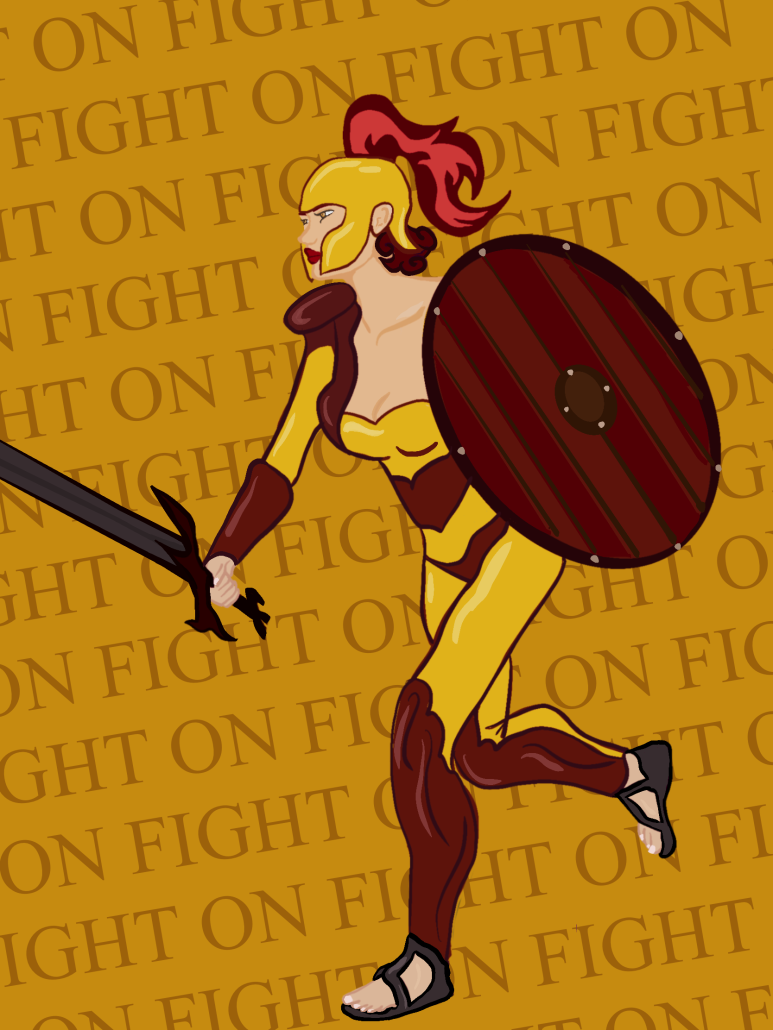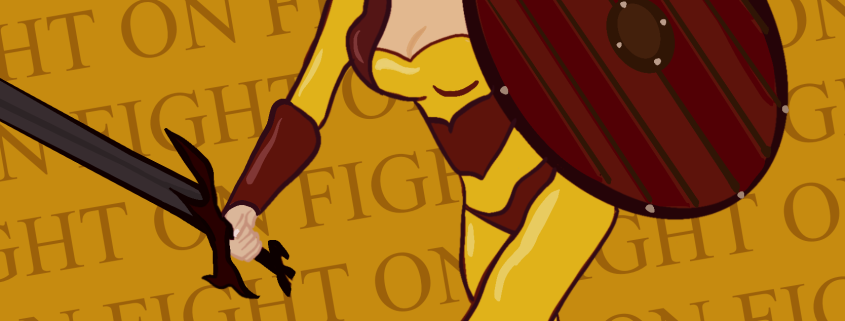Trojan Knights welcomes women members to its ranks

Passing by her friend, Jose Torres, in USC Village, Logan Christianson was handed a note card encouraging application to the Trojan Knights — a prominent spirit and service organization on campus known for its “tight-knit brotherhood.” Torres, one of the Knights’ outreach coordinators this semester, told her to pass it along to her friends. Christianson clarified — “Just the boys, right?” For the first time since 1921, the answer was “no.”
A male-dominated organization for most of its 101-year history, the Knights accepted women to its new member class this semester. As is the case with all Recognized Student Organizations, Knights’ membership remained open without discrimination to all genders and gender identities. The organization has had non-male and non-binary members, but women hadn’t previously been accepted to its ranks.
“For a long time, we’ve always, hypothetically, been able to accept applicants that are women,” said Ivan Paredes, a sophomore majoring in health and the human sciences, who serves as the Knights’ president. “This is one of the first years that we’ve had applicants that are women that were essentially filling out a serious application to enter the organization.”
Applications from women, Paredes said, had previously been “silly” and “jokey,” but this semester, the women applicants “interviewed well” and “fit the ideals of a Trojan Knight.” Out of a class of 25, five new members are women-identifying.
Christianson, a freshman majoring in international relations with an emphasis on global business, said she applied because she “loves everyone” she had met from Knights and knew that “Knights is one of the best ways to get involved on campus.”
“Every single guy that I’ve known and that I’ve met through Knights are just stand up, great people — the type of people that you want to be like lifelong friends with,” said Christianson, adding that she’s excited to hang out and volunteer through the organization as one of the “homies.”
While interviewing for the organization, Christianson said that she emphasized the importance of brotherhood to her. The term is woven into the Knights’ mission statement and is one of its three pillars, along with service and spirit, but Paredes said the organization welcomes all despite its perhaps “gendered” language.
“I believe that women can fit in a brotherhood,” Paredes said. “The language isn’t too deep to me, but I want to make it accessible and acceptable to everybody.”
In his position as the Diversity, Equity and Inclusion Council director in Fall 2021, Paredes pushed to “open up” the Knights to identities he noticed were lacking in the organization. Reception from other members to the expansion of membership was “less mixed” than he expected, and there was “essentially nobody in the organization that didn’t want it to change,” he said.
Paredes said he strives to create an open dialogue among the new members about their comfort levels and feelings about brotherhood, but he doesn’t want to place all the pressure on the women members to drive change.
“As a Black person, I’ve been in spaces where it’s kind of been my burden to make places more accessible, even though it really shouldn’t have been my burden,” Paredes said. “I feel the same way towards women in the organization.”
Another new member, Julia Haffie, knew a friend from high school in the Knights who encouraged her to apply. The new member process has been “so much fun,” Haffie said, and although the terminology the organization uses bothers her “a little bit sometimes,” the Knights have made her feel “comfortable.”
“The language is super old, and it has been traditionally men but the values underneath it, like the way that the people on leadership of Knights describe the values of brotherhood, it’s more like family than male-oriented,” said Haffie, a freshman majoring in human biology.
Paredes said he credits the rise in applications from women, in part, to broader outreach programs this semester. Torres, one of the outreach chairs alongside Ruben Nuñez, said that while the two weren’t “targeting any certain demographics,” they aimed to reach out to as many people as possible for recruitment. The pair utilized social media posts, info sessions and a variety of engagement events hosted at the start of the semester — including field day, dodgeball and Bob Ross night — to spread the word.
Torres said the change to accept women was a “long time coming,” and the new women members add to the environment “in every way possible.” He said he believes “brotherhood” to be a gender-inclusive term but wants to continue to have conversations about the Knights’ image and presentation. Steps the organization has taken, Torres said, include encouraging members not to assume pronouns and shifting away from language that “alienates” women.
The Knights’ constitution changed over the past two semesters, Paredes said, to modify objectively gendered words to more inclusive ones, including changes from “brother Knights” and “men” to “fellow Knights” and “people.”
“Yes, we are very male-presenting. Like a lot,” said Torres, a freshman majoring in astronautical engineering. “Why is that and what can we do to change that?”
A spirit leader her freshman and sophomore years, Veronica Matthews, a senior majoring in business administration, has always been passionate about USC. After hearing that the Knights were encouraging non-male identifying applicants, Matthews decided to join the Knights during the second semester of her senior year because she “didn’t want to have any regrets.”
Painting at games — a Knights tradition wherein members write team numbers or spirited messages on their bare chests — was something Matthews had always wanted to be a part of, but she wasn’t sure how it would work for the women in the organization. Donning a red bandeau bra with spirit paint overtop, Matthews said she made one of her “core memories” painting with the Knights at a basketball game.
Other Knights have treated Matthews as “one of their brothers,” and have given her the opportunity to speak up if she becomes uncomfortable.
“I was, of course, worried going into it — I think any woman would be — but any doubt I had, any fear I had about not being treated like everybody else in the organization was quickly dispelled,” Matthews said.
Diego Dela Rosa — one of the organization’s non-male identifying members — has been a part of the Knights since Spring 2020 and said the Knights community was extremely supportive when they came out as gender-queer during the pandemic.
“I actually depended a lot on people I’ve met in Knights when I was going through that, and they offered me so much support and were just there throughout the process,” Dela Rosa said.
While the organization operated remotely, Dela Rosa, a senior majoring in visual and performing arts, was invited to conduct a presentation to general members about “ways we can support other non-male identifying people.” Overall, Dela Rosa said, despite being “a little bit scared” before coming out to the Knights, it has been a “great journey.”
The Knights have not been immune to reports of hazing and inappropriate conduct — the organization was inactive in 2018 following misconduct allegations. While none of the members interviewed were present during the suspension, Paredes, who joined three semesters ago, said the organization has made “drastic steps away from 2018,” which he said was further encouraged by the conversations sparked by last semester’s reports of sexual assault and misconduct at fraternities on Greek Row.
“Especially with last semester with Greek life, that was another igniting factor that kind of reminded us of why we need to take steps further away,” Paredes said. “Because, certainly, if you don’t have these conversations, people forget about them.”
The Knights’ current faculty supervisor and former Knight Joe Way said the organization believes that many allegations brought to the light in 2018 “were not necessarily true of the org as a whole.”
“The organization did talk about how they wanted change,” said Way, who also serves as the director of learning environments for the University’s information technology services. “They wanted to move beyond what was thought about the org.”
Way said the move to accept women is a reflection of the Knights “growing as society grows” by forefronting inclusivity and said he looks forward to other campus organizations following in the Knights’ tread.
Helenes — the partner organization of the Knights and the “official hostesses of the University of Southern California” — is founded on similar tenets, such as spirit, service and tradition. Helenes are “united in sisterhood,” the organization’s website reads, and have historically been composed of women, although there are non-women identifying members currently in Helenes, said Emilee LeVeque, the organization’s director of public relations.
LeVeque, a sophomore majoring in political science, said that with the recent expansion of membership to gender non-conforming members came changes in the language the Helenes use — including a shift from the “sisterhood” pillar to more inclusive terms such as “family,” though “sisterhood” remains in the organization’s mission statement. Helenes has not received applications from cisgender men in any of its applicant cycles, but LeVeque said she believes that “if they make a good Helene, they should be in Helenes.”
“I believe Helenes is definitely open to accepting them,” LeVeque said. “We want to make sure that we have people who we do believe would be a good fit within our organization.”
A merger of the Helenes and the Knights is not expected any time soon, LeVeque said, as the structure and culture of the organizations vastly differ.
“To my knowledge, we don’t plan on doing that,” LeVeque said. “We both internally are structured so differently that I don’t think that’d be a feasible thing to be able to go to combine our orgs.”

